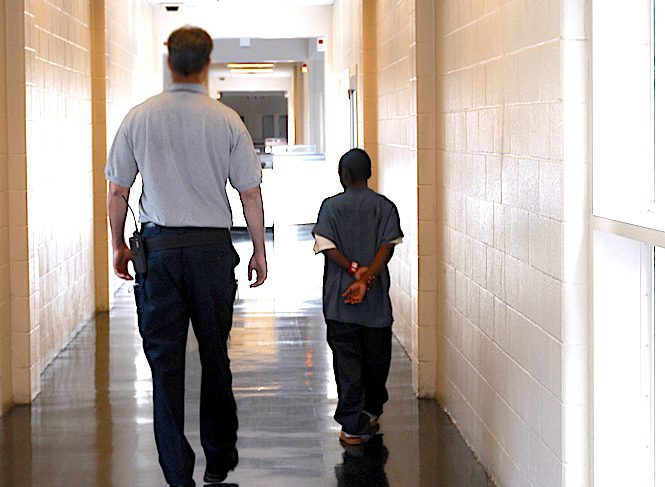Keeping Children Out of Jail is ‘Main Street’ Conservatism

Nothing about this year has been normal. Today, we’re facing a global pandemic, mass protests over racial injustice, and an economic recession. The young people in our juvenile justice system have not been exempted from these changes; cases have been delayed, and juvenile courts have temporarily closed or gone virtual.
Yet, these current challenges present a possible inflection point: an opportunity to dismantle government overreach throughout our juvenile and criminal justice systems and to reinstate the primacy of limited, effective government in policymaking. We should begin this process by permanently reforming youth probation, removing policies that often serve as barriers to rather than promoters of future success and rehabilitation.
A few probation practices today exacerbate rather than end the cycle of arrest, probation and incarceration. For one, probation conditions can be overly inclusive and detached from the young person’s individual circumstances: A survey by the National Juvenile Defender Center found young people were assigned up to 30 conditions of probation. This hardly demonstrates limited, effective government. Rather, it brings to life one of the core fears of our founding fathers: that government, left unchecked, would grow increasingly involved in personal matters and restrict individual liberties’ for matters of little importance.
This problem compounds when considering that thousands of young people are locked away in local detention and correctional facilities every year for “technical” violations—behavior that is not a criminal act and may be as simple as missing a check-in with your probation officer, skipping school, staying out past curfew, or failing to pay ordered fines and fees. To incarcerate a young person for something that is not a crime is the apogee of government intervention; it demonstrates a disturbingly flippant approach to a person’s individual liberty. At all times, such intervention should be reserved as a last resort to ensure public safety. Missing class surely does not fit that criteria, and punishing children and families for their poverty is neither humane nor just.
Perhaps, for some, this contradiction of our principles would be worth it, if these probation practices truly promoted public safety. But young people on probation are still re-arrested and reconvicted at concerning rates. As one example, in Texas, 62 percent of young people adjudicated and placed on probation in 2015 were re-arrested within three years, and 24 percent of the same cohort were adjudicated, re-adjudicated, convicted, or reconvicted within three years. And research suggests conditions paying like fines and fees may actually abet, not deter, youth recidivism.
Thankfully, current conditions have prompted some policymakers to reconsider their practices. In places like Hennepin County, Minnesota, the fines and fees associated with justice involvement were temporarily suspended. In Multnomah County, Oregon, probation conditions are being amended or fulfilled more creatively; young people ordered to perform community service as a condition of probation may instead complete chores around the house. And, given the public health threat of housing youth in juvenile facilities, many localities are more wary of incarcerating youth without a clear, imminent public safety rationale.
In some cases, officials have outright banned the incarceration of youth for technical violations for a certain time. And, in other places, they’ve prompted probation personnel to more actively problem-solve by altering a young person’s individualized probation plan and conducting a case review rather than becoming reliant on violations or incarceration.
Some departments have been quick to offer holistic, family support and coaching, recognizing that the pandemic can both exacerbate normal family challenges and serve as a chance to build stronger intrafamilial relationships and conflict resolution skills. In New York City probation personnel previously tasked with drafting pre-sentencing reports were asked to conduct wellness calls to families. And In Multnomah County, several families with youth on probation have received rent assistance, and juvenile court counselors have actively used their relationships with parents to collaborate on how to react to common youth misbehavior and account for basic needs.
These changes have meant that some probation departments are acting more like family coaches and youth development advocates than simple disciplinarians. This is a positive shift, which can transform children’s experiences and success with probation. According to Demecia Wilson, Chief of Probation for Lucas County, “Kids know that there are people looking out for them.”
However, these reforms have hardly occurred across-the-board. And, as stay-at-home orders are lifted and the perceived public health threat begins to fade, these steps are at risk of being reversed in the coming months and year to come. Ironically, the need for a smart, efficacious probation system will only grow: practically, states are facing large budget shortfalls, and incarcerating a young person can run upwards of hundreds of thousands of dollars per year.
For all these reasons, it would be commonsense to trim government involvement, ensure probation conditions actually promote youth development and rehabilitation, and stop incarcerating young people for technical violations. As would it be imprudent to charge impoverished young people and their families fines and fees amidst a global recession, which has pushed young people, in particular, out of the economic market. Policymakers should be quick to reform youth probation and make any temporary fixes permanent.
Emily Mooney (@emilymmooney) is a resident criminal justice policy fellow at the R Street Institute.
Comments